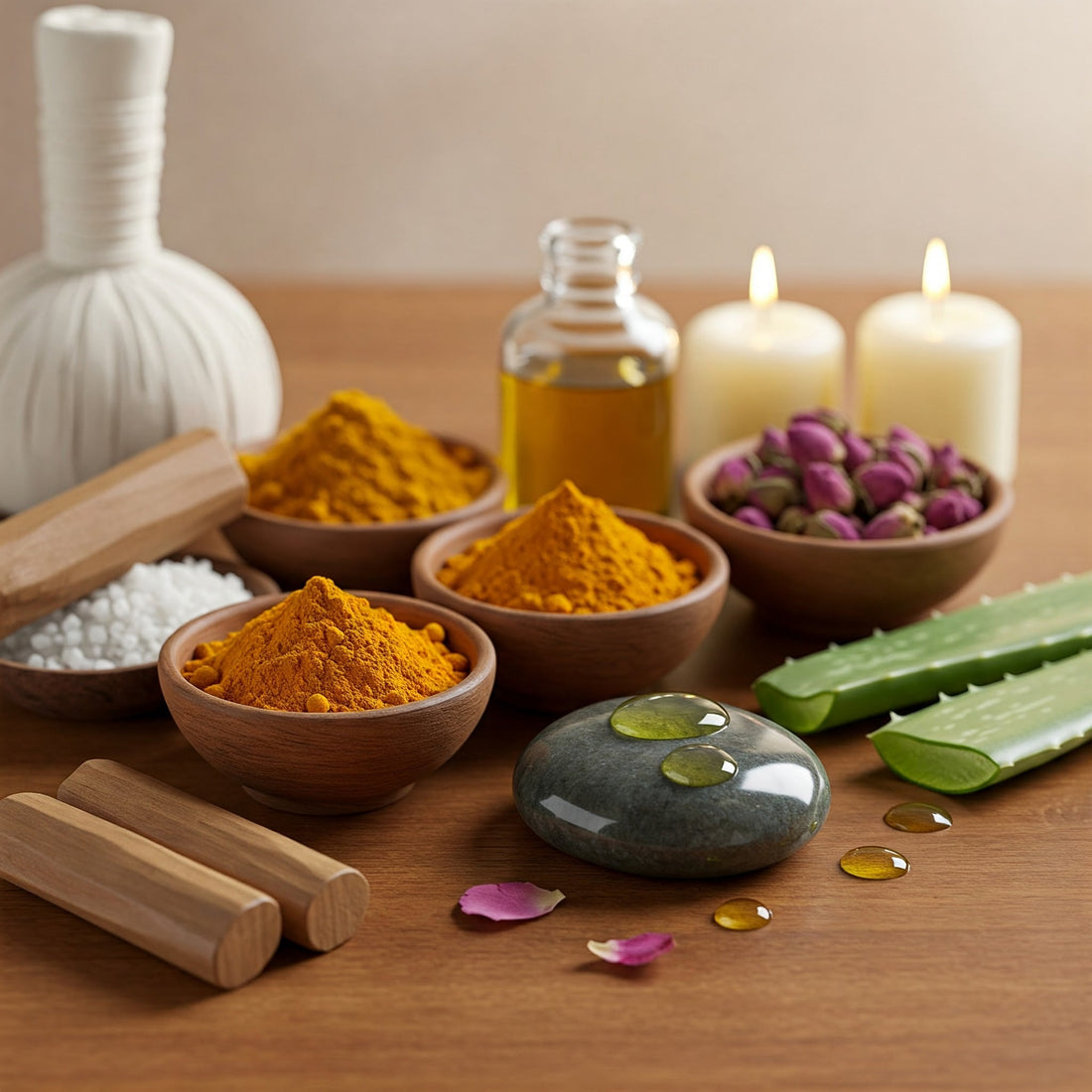
Skincare Secrets from Ancient India: Ayurvedic Practices for a Healthy Complexion
TrueBliss SkincareFor centuries, India has been a treasure trove of holistic wellness practices, and at its heart lies Ayurveda, the ancient science of life. More than just a system of medicine, Ayurveda is a philosophy that emphasizes balance and harmony between mind, body, and spirit. And guess what? This wisdom extends beautifully to skincare, offering time-tested secrets for achieving a healthy, radiant complexion, naturally.
In today's world, bombarded with synthetic ingredients and quick-fix solutions, turning to Ayurvedic skincare principles feels like coming home to nature. It's about understanding your unique skin, nourishing it with potent natural ingredients, and embracing rituals that promote long-term skin health and overall well-being. Ready to unlock these ancient skincare secrets? Let's delve into the world of Ayurveda and discover how to achieve your most radiant skin yet.
Understanding Your Unique Skin: The Doshas
Ayurveda believes that everything in the universe, including us, is composed of five elements: space, air, fire, water, and earth. These elements combine to form three fundamental energies or life forces, known as Doshas: Vata, Pitta, and Kapha.
Each Dosha governs specific bodily functions and characteristics, including skin type. Understanding your dominant Dosha (or combination of Doshas) is key to tailoring your Ayurvedic skincare routine for optimal results.
- Vata Dosha (Air & Space): Characterized by dryness, coolness, and lightness. Vata skin tends to be dry, thin, fine-pored, and prone to dryness, wrinkles, and sensitivity.
- Pitta Dosha (Fire & Water): Associated with heat, oiliness, and transformation. Pitta skin is often sensitive, prone to acne, redness, inflammation, and pigmentation issues.
- Kapha Dosha (Earth & Water): Represents heaviness, coolness, and stability. Kapha skin tends to be oily, thick, large-pored, and prone to blackheads, enlarged pores, and congestion.
While you might lean towards one dominant Dosha, most people are a combination. You can often identify your dominant skin type by observing its characteristics. Online quizzes and Ayurvedic practitioners can help you determine your Dosha constitution more accurately.
Treasures from Nature: Key Ayurvedic Skincare Ingredients
Ayurveda emphasizes the power of natural ingredients, particularly herbs, spices, oils, and clays. Let's explore some of the most revered ingredients for healthy, glowing skin:
-
Turmeric (Haldi): The Golden Healer: Turmeric, a vibrant yellow spice, is a cornerstone of Ayurvedic skincare. Its potent anti-inflammatory, antiseptic, and antioxidant properties make it a powerhouse for addressing various skin concerns.
- Benefits: Brightens complexion, reduces blemishes and acne, fights inflammation, promotes wound healing, and protects against free radical damage.
- Uses: Face masks, scrubs, cleansers, and even ingested for internal benefits.
-
Sandalwood (Chandan): Cooling and Calming: Sandalwood, with its fragrant wood and cooling properties, is treasured for its soothing and skin-clarifying benefits.
- Benefits: Calms irritated and inflamed skin, reduces redness and acne, balances oily skin, tightens pores, and imparts a radiant glow.
- Uses: Face masks, pastes, toners, and essential oil (diluted).
-
Oil Cleansing: The Gentle Purifier: Oil cleansing, a traditional Ayurvedic practice, might seem counterintuitive for oily skin, but it's based on the principle that "like dissolves like." Using the right oils can gently cleanse, remove impurities, and balance skin's natural oil production.
- Benefits: Gently removes makeup and dirt, balances oil production, hydrates skin, soothes inflammation, and improves skin texture.
- Oils to Consider: Coconut oil (for dry skin), sesame oil (for Vata/balanced skin), almond oil (for all skin types), neem oil (for acne-prone skin).
-
Aloe Vera: The Soothing Succulent: Aloe Vera, with its cooling and hydrating gel, is a staple in Ayurvedic skincare for its soothing and healing properties.
- Benefits: Hydrates and moisturizes skin, soothes sunburns and irritations, reduces inflammation, promotes wound healing, and improves skin elasticity.
- Uses: Gel applied directly to skin, ingredient in face masks, moisturizers, and serums.
-
Neem: The Purifying Powerhouse: Neem, with its potent antibacterial, antifungal, and antiviral properties, is highly valued in Ayurveda for its ability to purify and protect the skin.
- Benefits: Treats acne and breakouts, combats infections, soothes eczema and psoriasis, reduces inflammation, and purifies the skin.
- Uses: Face washes, masks, oils, and spot treatments for blemishes.
-
Licorice (Yashtimadhu): The Brightening Agent: Licorice root is known for its skin-brightening and anti-inflammatory properties, making it effective for addressing pigmentation and uneven skin tone.
- Benefits: Brightens skin complexion, reduces hyperpigmentation and dark spots, soothes inflammation, and provides antioxidant protection.
- Uses: Face masks, serums, and creams targeting pigmentation.
Ayurvedic Skincare Practices for a Radiant Glow:
Beyond ingredients, Ayurveda also emphasizes daily rituals and practices that contribute to healthy, radiant skin:
-
Abhyanga (Self-Massage with Oil): Daily self-massage with warm oil is a cornerstone of Ayurvedic self-care. It improves circulation, lymphatic drainage, nourishes the skin, calms the nervous system, and promotes overall well-being, which reflects in healthy skin.
- Oils for Abhyanga: Sesame oil (warming, good for Vata and Kapha), Coconut oil (cooling, good for Pitta), Almond oil (balancing for all Doshas).
-
Ubtan (Herbal Body & Face Mask): Ubtan is a traditional Ayurvedic exfoliating and cleansing paste made with herbs, flours, and clays. It gently removes dead skin cells, brightens complexion, and nourishes the skin.
- Common Ubtan Ingredients: Chickpea flour (besan), turmeric, sandalwood powder, gram flour, yogurt, milk, honey, rosewater. (DIY recipes are easily found online).
-
Face Masks for Dosha Balance: Tailor your face masks to your dominant Dosha or skin concern.
- Vata (Dry Skin): Hydrating masks with avocado, honey, almond oil, yogurt.
- Pitta (Sensitive/Inflamed Skin): Cooling and soothing masks with sandalwood, aloe vera, cucumber, oatmeal.
- Kapha (Oily/Congested Skin): Cleansing and purifying masks with clay (Fuller's Earth, Kaolin), turmeric, neem, lemon juice (used sparingly and diluted).
-
Diet and Lifestyle Harmony: Ayurveda emphasizes that true beauty comes from within. A balanced diet, mindful lifestyle, adequate sleep, stress management, and regular exercise are crucial for healthy, glowing skin. Focus on fresh, whole foods, seasonal fruits and vegetables, and drink plenty of water.
Embrace TrueBliss: Modern Skincare Rooted in Ancient Wisdom
Now, how can you seamlessly integrate these ancient Ayurvedic secrets into your modern skincare routine? Enter TrueBliss Skincare, a brand that beautifully blends traditional Ayurvedic wisdom with contemporary formulations. TrueBliss understands the power of nature and crafts its products with luxurious oils, butters, and time-tested herbal ingredients, while staying true to the "free-from" philosophy – avoiding harsh chemicals like silicones, parabens, and mineral oils.
One standout product that perfectly embodies the Ayurvedic approach is the TrueBliss Indian Ayurvedic Herbal Body Scrub. This ready-to-use Ubtan is a modern interpretation of a classic Ayurvedic recipe, making it incredibly convenient to incorporate into your daily routine.
Let's look at how the TrueBliss Indian Ayurvedic Herbal Body Scrub aligns with Ayurvedic principles and ingredient power:
-
All-Natural Ingredient Powerhouse: It's crafted with a potent blend of Ayurvedic ingredients you just learned about:
- Turmeric: For brightening, anti-inflammation, and antiseptic benefits.
- Sandalwood Powder: For cooling, calming, and skin-clarifying action.
- Fuller's Earth Clay (Multani Mitti) & Kaolin Clay: Traditional clays known for their cleansing, oil-absorbing, and skin-whitening properties (tan removal).
- Chickpea Flour (Besan): A gentle exfoliant and skin-softening agent, a staple in Ubtans.
- Organic Licorice: For brightening and addressing pigmentation.
- Natural Herbal Powders: A blend of traditional herbs chosen for their specific skin benefits (likely to include ingredients like Neem, Tulsi, etc., though not explicitly listed, typical of Ayurvedic formulations).
- Nourishing Oils & Butters: Cold-pressed Coconut oil, Castor oil, Olive oil, and Shea Butter provide essential moisture and nourishment, balancing the exfoliating and cleansing action of the scrub.
-
Ready-to-Use Convenience: TrueBliss has taken the traditional Ubtan concept and made it incredibly user-friendly. No messy mixing of powders and oils – it's a perfectly balanced, ready-to-use cream-based scrub.
-
Gentle Exfoliation & Nourishment Combined: The Walnut shell powder provides gentle physical exfoliation to remove dead skin cells, while the cream base and nourishing oils ensure your skin isn't stripped dry but rather left soft, supple, and hydrated.
-
Daily Use & Versatility: Gentle enough for daily use instead of soap, making it a seamless addition to your shower routine. Suitable for all skin types, including children, highlighting its mild and natural formulation.
Beyond the Body Scrub, explore TrueBliss's range of face creams, face masks, and body oils, many of which likely incorporate other key Ayurvedic ingredients discussed earlier, such as Aloe Vera, Neem, and other beneficial herbs and oils.
Embrace the Timeless Wisdom of Ayurveda for Modern Radiance
Ayurvedic skincare is more than just a trend; it's a timeless system of self-care that emphasizes natural ingredients, holistic practices, and understanding your unique skin. By incorporating Ayurvedic principles and ingredients into your routine, and exploring brands like TrueBliss that honor this ancient wisdom, you can unlock the secrets to a healthy, radiant complexion – naturally, and sustainably. Step into the world of Ayurveda and discover the bliss of balanced, beautiful skin!
